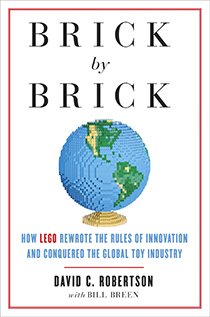 |
Every once in a while smart things come out of my mouth, and it is nice when other people recognize that. I was recently quoted by the ink and paper medium in Brick by Brick: How LEGO Rewrote the Rules of Innovation and Conquered the Global Toy Industry ISBN: 978-0-307-95160-1 As Stephen Calender, a former Universe developer, put it in an interview with the blog MMO Fallout, producing a flawless game with nearly one million lines of code “would be like getting a perfect score on a math test with that many questions.” |
The excerpt in its entirety:
…
“That was one of those things where we just never agreed,” said Brown. “But what could we do? It was their IP, and LEGO would never give in on the quality of the brick rendering.”
The push for perfection breached the logic of a disruptive innovation. At first it’s fine if the disruptive product is low-end and low-quality, so long as it’s easy to use and works well enough to attract less-demanding customers who don’t care if, say, a LEGO logo is etched into each stud of every brick. It’s better to put a cheaper price tag on the product, launch it even though it’s less than ready for prime time, and then make improvements (an charge more) as it moves upmarket. LEGO, however, spent years working to get Universe just right, which cost it the disruptor’s advantage.
The LEGO Group’s insistence that Universe deliver an ultra-premium play experience even showed up in the RFP we mentioned earlier. A LEGO lawyer inserted a provision that Universe, upon its release, must be entirely free of bugs. It was a preposterous demand, especially for a game that would require somewhere between half a million and a million lines of code. The request signaled that the LEGO Group’s innermost value, “only the best,” would bump up against the disruptor’s “good enough” ethos, perhaps best expressed by a maxim credited to Facebook cofounder Mark Zuckerberg: “Better done than perfect.” In the months and years to come, LEGO and NetDevil would ceaselessly struggle to smack back bugs and achieve a rough equilibrium between less than perfect and better than merely done.
The disconnect between NetDevil and LEGO over Universe’s quality loomed larger as development got under way. At any one time there were thirty or more programmers working on Universe, all changing code in different parts of the game. As Stephen Calender, a former Universe developer, put it in an interview with the blog MMO Fallout, producing a flawless game with nearly one million lines of code “would be like getting a perfect score on a math test with that many questions.”
Five years later, when Universe was finally launched, the development team had slashed the game’s most bothersome bugs to well below the industry standard. Nevertheless, seven months after the game’s release, Ronny Scherer, a LEGO veteran and Universe’s project manager, still wasn’t satisfied. “My house here in Colorado has all these nice features, but its questionable quality means it’s going to need a big overhaul in ten years,” he told us. “NetDevil was making software the same way. And fundamentally, LEGO doesn’t think like that. We want to make sure that when we build something, we build it to last.”
Thanks for reading, and remember, we are all in this together.
 |
|